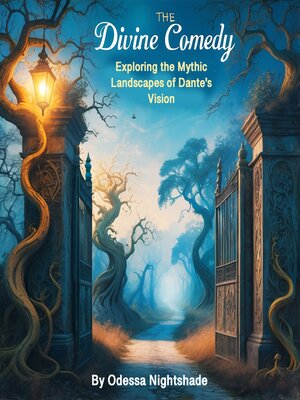The Divine Comedy
audiobook (Unabridged) ∣ Exploring the Mythic Landscapes of Dante's Vision
By Odessa Nightshade

Sign up to save your library
With an OverDrive account, you can save your favorite libraries for at-a-glance information about availability. Find out more about OverDrive accounts.
Find this title in Libby, the library reading app by OverDrive.



Search for a digital library with this title
Title found at these libraries:
| Library Name | Distance |
|---|---|
| Loading... |
Few works in literary history have shaped the cultural and spiritual imagination of the Western world as profoundly as *The Divine Comedy*. Written in the early 14th century by the Florentine poet Dante Alighieri, this epic journey through Hell, Purgatory, and Paradise is more than just a tale of the afterlife—it is a meditation on justice, redemption, and the human soul's search for divine truth. As both a poet and a visionary, Dante crafted a work that bridges medieval theology, classical influences, and deeply personal reflections, creating a narrative that continues to resonate with readers across centuries.
To fully appreciate *The Divine Comedy*, it is essential to understand the world that shaped Dante and the literary traditions that influenced him. Born in 1265, Dante lived in a politically tumultuous Italy, marked by factional strife between the Guelphs and Ghibellines, conflicts that would deeply impact his life and writing. Exiled from his native Florence, he poured his exile's anguish and his longing for justice into the verses of *The Divine Comedy*, transforming personal suffering into an allegorical masterpiece. His work reflects not only his political frustrations but also his devotion to philosophy, theology, and the poetic traditions of Virgil and the classical world.
At its core, *The Divine Comedy* is an allegory of the soul's journey toward God. Each of its three realms—*Inferno*, *Purgatorio*, and *Paradiso*—represents stages of moral and spiritual transformation. *Inferno* exposes the consequences of sin, *Purgatorio* explores the trials of purification, and *Paradiso* reveals the ultimate joy of divine enlightenment. This structure serves not only as a vivid depiction of the afterlife but also as a guide for readers seeking moral and spiritual understanding in their own lives.







